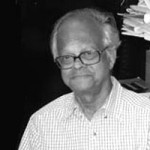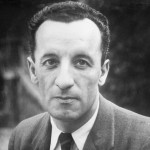Mohanty on Intentional Acts
Feb 2nd, 2013 | By Marc Applebaum | Category: PraxisReading J. N. Mohanty’s essay “Husserl’s Concept of Intentionality” in Analecta Husserliana I (1971), the following passage, discussing the Logische Untersuchungen, stood out to me:
“The static analysis lays bare the structure of what is called an intentional act whereby the word ‘act’ has to be taken not in its ordinary usage as meaning an activity or a process, but simply standing for all intentional mental states. Intentionality is not a kind of activity, but the ordinary concept of action is itself an intentional concept.” (p. 106)
Now, this kind of understated brilliance is typical of Mohanty. Perhaps the lovely reversal he makes in this passage would already be self-evident to a good continental philosopher, but as a psychologist, I found it stunning because the notion of “acts” of consciousness always felt awkward to me. Certainly there are lived-experiences in which we are keenly aware of “acting;” for example, looking for my keys, trying to remember when I agreed to call my friend, or seeking to grasp the meaning of a difficult passage in a book.
 But more often, the lived-world is the sea I swim in, which shapes me, to which I’m called to respond, not from outside (as if such a thing were possible) but from within the lived-world, in my belonging to it. In the flow of everyday life, I am only rarely self-reflectively aware of “acting” consciously–only retrospectively can I consider how I acted consciously. So in the context of intentionality–the reaching out (intendere) of consciousness toward the world–it never felt quite right to me to conceive of intentionality as a series of “acts” in the sense of activities initiated in some way by an actor, if that actor is meant to be me!
But more often, the lived-world is the sea I swim in, which shapes me, to which I’m called to respond, not from outside (as if such a thing were possible) but from within the lived-world, in my belonging to it. In the flow of everyday life, I am only rarely self-reflectively aware of “acting” consciously–only retrospectively can I consider how I acted consciously. So in the context of intentionality–the reaching out (intendere) of consciousness toward the world–it never felt quite right to me to conceive of intentionality as a series of “acts” in the sense of activities initiated in some way by an actor, if that actor is meant to be me!
And indeed, a good phenomenological philosopher would quickly point out that chosen acts of consciousness are but one form of intentionality–for example, in conscious position-taking. Etymology, as Ferrarello kindly pointed out, supports this interpretation of “act”: in classical Greek, agein bion (or in Latin, agere vitam) means experiencing or living, so the root meaning of “act” is centered upon participating in being-alive-in-the-world. The root sense of agein, based on ἄγω-, is “to carry on” or “to tend toward something.” With this core sense, with which Husserl was undoubtedly familiar, we return to the lived-sense of intentional acts of consciousness, for phenomenology.
Mohanty’s short statement clarifies that we ought not imagine “intentional act” as a kind of “owned” activity. It is rather that the way we grasp “action” or “activity” in the world is itself intentional. If our everyday intending is not this sort of action, then what is it? How can we describe it? Certainly the Husserliana offers better formulated answers, but here is a spontaneous exploration: is it not the case that our intending is always already in the world, prior even to our recognition of ourselves as present? Isn’t that recognition a byproduct of that already-present intending–the way we see objects in a room only because light is already there for us, the means whereby we see objects and ourselves? Isn’t intending more like this pre-given light, and only within the horizon of a world I see am I able to choose to act–for example, to look for my keys?
Merleau-Ponty (1996) says something wonderful in his Phenomenology of Perception:
It is a question of recognizing consciousness itself as a project of the world, meant for a world, which it neither embraces nor possesses, but towards which it is perpetually directed–and the world as this pre-objective individual whose imperious unity decrees what knowledge shall take as its goal. (xvii-xviii)
There is something ecstatic in what we call the intentional act, precisely because it is not “my act” or my activity, but rather is the mark of our already-participating in the world as the world’s project, as Merleau-Ponty says. Perceiving is in this way always a discovery rather than an achievement–or, we could say, the world seeing itself through us.
References
Merleau-Ponty, M. (1996). Phenomenology of Perception (C. Smith, Trans.). New York: Routledge.
Mohanty, J. N. (1971). Husserl’s concept of intentionality. in A.T. Tymieniecka (Ed.) Analecta Husserliana: The yearbook of phenomenological research, Vol. I. , pp. 100-132. New York: Humanities Press.
photo credits
child running: pasma via photopin cc, bird in flight: john curley via photopin cc
Thanks to J. N. Mohanty for permission to use his photograph


 Follow
Follow email
email
Perhaps the most important starting point for a clinician such as myself is to recognize acts as an outgrowth of intention. It is with this that we can help clients understand what they are motivated by and get congruent with themselves and in their relationships with this discovered motivation. Getting congruent with themselves and their relational world seems to me to be the main focus of psychotherapy.
It’s an interesting point Yusef. I haven’t read a good discussion of the relationship between intentionality as a property of consciousness and “intention” the way it’s used in clinical psychology. Two articles that might be of interest for you are Fred Wertz’s (2005) “Phenomenological Research Methods for Counseling Psychology,” in the Journal of Counseling Psychology, and Ian R. Owen’s (2007) “Understanding the Ubiquity of the Intentionality of Consciousness in Commonsense and Psychotherapy,” in the Indo-pacific Journal of Phenomenology. Here’s a link to Fred’s article: http://files.meetup.com/1329080/Phenomenological_Method_for_Psychology_2005.pdf
Marc – I love the passages you’ve chosen from Mohanty and Merleau-Ponty, and your own thoughts about how we already “are” in the world crystallized this concept for me. I am, as you know, in the process of reading Titchener’s (1898, 1899) work about consciousness, and I have found it quite tedious as it dissects the anatomical from the psychic in psychology. Where I struggle with his concepts, I am coming to realize, is that I see consciousness as very much the way you have described it above:
“our intending is always already in the world, prior even to our recognition of ourselves…Isn’t that recognition a byproduct of that already-present intending…Isn’t intending more like this pre-given light, and only within the horizon of a world I see am I able to choose to act…”
As I examine it, I intrinsically feel and experience my consciousness that “is” before I am even aware. Our intentionality, perhaps, precedes us.
Tichener, E.B. (1898). The postulates of a structural psychology. Philosophical Review, 7, 449-465.
Tichener, E.B. (1899). Structural and functional psychology. Philosophical Review, 8, 290-299.
Susan, thank you for your comments–it is exactly in this way that phenomenology is lived, through reflection that then returns to the evidence of perception. In other words, as you exemplify in your comment, we return to our lived-experience–not in their idiosyncrasies but as broadly human and intersubjective–in order to examine the claims made by psychological theorists. And then we dialogue with others, to test and refine our own insights.
Best wishes with Tichener! Amedeo had me read E. G. Boring’s landmark “History of Experimental Psychology” at the very beginning of my phenomenological studies, and my experience was much the same. After Boring, Giorgi’s (1970) “Psychology as a Human Science” felt like liberation!